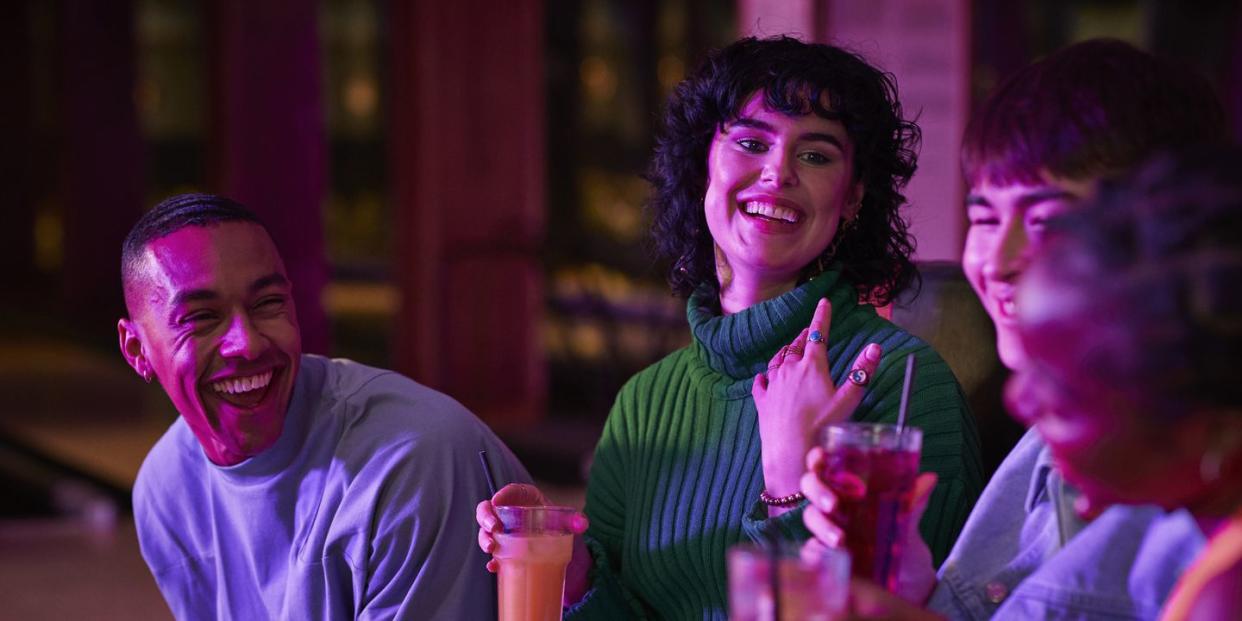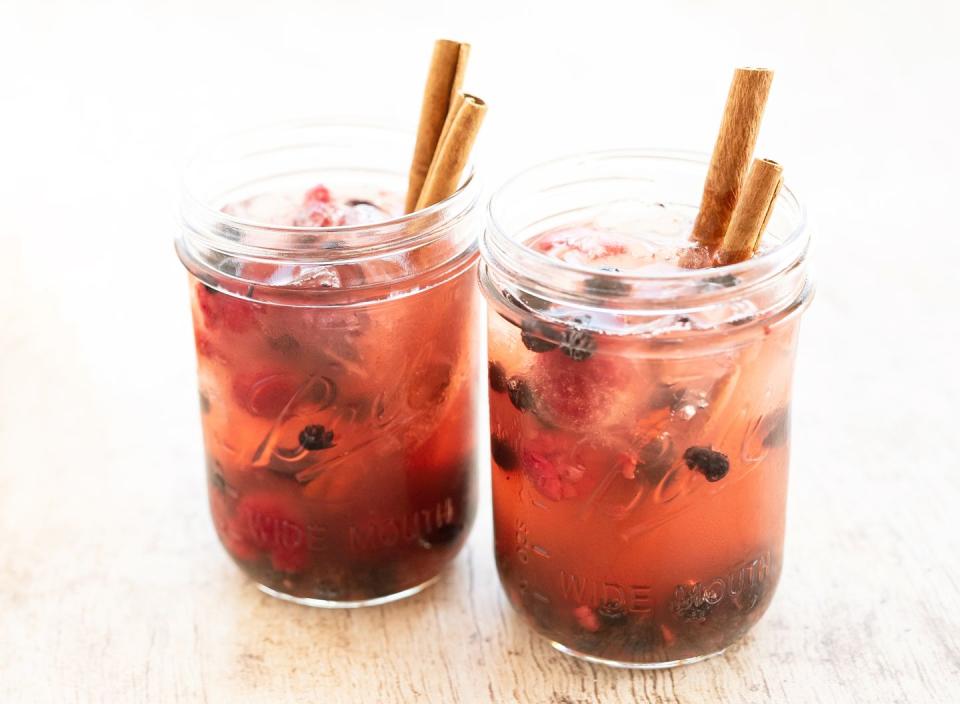Are you sober curious? Here's EYNTK

Seen the term 'sober curious' pop up across social media as of late and wondered what it means? Over the past few years, there’s been a growing movement
of people who are choosing to cut down their booze consumption or stop drinking altogether. Over 140,000 people took a month off drinking for Dry January or Sober October in 2022, and the amount of quality alcohol-free drinks brands on the market has been steadily – and thankfully – increasing.
But what does it mean to be sober curious, and how is it different from mindful drinking or going teetotal? Here, we asked two experts to dive into the benefits of wanting to be more conscious of what you drink and what the experience is really like.
What does it mean to be sober curious?
Basically, being sober curious means you’re thinking about drinking less, considering not drinking at all, or trying out cutting back or drinking differently here and there, whether your reasons are to do with your mental and physical health, lifestyle, wellbeing, finances (that cost of living crisis isn’t going anywhere soon), or a mix of them all. Gayle Macdonald, sober coach and founder of Sober Bliss, explains that starting off sober curious can be a bit more relaxed than going teetotal straight away. "It’s not about [immediately] giving up alcohol completely or forever, which can be quite scary or steeped in shame and guilt. It’s more about looking at your relationship with alcohol and the role it plays in your life."
Some people share their newfound curiosity on social media, which helps to normalise wanting to be more thoughtful about your drinking. As Laura Willoughby, founder of the world's largest mindful drinking movement Club Soda, adds, "connecting with others online creates a sense of community and is a way to create some accountability for your change – it’s important to know that you are not alone." And then it's once you actually decide to take permanent action following your curiosity, that you may become a mindful drinker, or completely sober.
Why are people sober curious?
Drinking culture has changed a lot – since 2005, younger drinkers have reported drinking less and less (it just isn't as cool these days!), and teetotalism has increased among those aged 16-44. Willoughby links the drop in drinking for younger people to our growing awareness of how alcohol can impact our mental health, as well as the wealth of booze-free brands now on the market. With more understanding of the effects and endless alternative options available, it can feel weird to not even consider our drinking habits.

How do you go sober curious?
It's more about just being sober curious if you find yourself thinking about what it would be like to drink less, which may include incorporating some elements of this into your lifestyle to see how it goes. "Don’t just do what you always do out of habit. A first step is to ask important questions like 'do I really need this glass of wine or would I be better off not drinking tonight?’ Asking deeper questions about what you really need at that moment or why you’re reaching for a drink will help to uncover the reason behind your drinking," Macdonald says.
There are practical ways to explore that curiosity. "You could try keeping a journal of any benefits you experience after choosing not to drink, like better sleep, no hangovers and less anxiety. This evidence could help you see that you can have fun, relax and cope without alcohol," she adds, which in turn could help if you decide if being sober is right for you. "This is a very personal journey and it’s important to focus on yourself and how alcohol is making you feel."
Willoughby also encourages you to reflect on what you want your future to look like, as this could allow you to work out how changing your drinking could help you achieve that goal.
If you want to test out being sober before actually making the commitment, she suggests practicing some different techniques. "Find a favourite alcohol-free drink you like so you know what to ask for when you’re out. Substituting an alcoholic drink for an alcohol-free one makes things much easier," she says. "And if you are not enjoying yourself, go home! We’ve been taught to stay at things we don’t enjoy by drinking – this is ridiculous!"
Now, did that work for you? Reckon you could do that long term?
Are there benefits to being sober curious?
In a nutshell, drinking less itself has a whole host of benefits – some people might find it reduces their anxiety symptoms or see an improvement in their mental health, others realise that they’ve got a lot more energy and sleep better without overdoing it on the tipple. You also won’t get hangovers – big win.
Willoughby adds that you’ll most likely reduce your calorie intake from switching to low or no-alcohol options (and avoiding the late night munchies) and reduce your stress levels, as well as supporting your overall health and wellbeing.
But even if you don't end up making any big changes, you can't not benefit from a period of reflection and looking at your relationship with alcohol. You may wish to contemplate it again in the future, or take on board what you learnt in other ways.
Whatever your reasons for wanting to quit drinking, there are so many benefits for all of us to be more mindful of reducing the harmful effects of alcohol in our lives.

Most people won’t experience any major side effects of cutting down their drinking, but for some it can be dangerous to suddenly quit. "This depends on how much you’ve been drinking, for how long and the level of physical dependence on alcohol," Macdonald explains. "If you’re in any doubt, speak to a medical professional first and be honest about how much you’re drinking."
Changing your alcohol intake can be an adjustment, so Willoughby recommends exploring sober curious podcasts, books and blogs. Macdonald also suggests connecting with sober groups IRL or online, seeing a coach or therapist if you want to dig deeper and telling your family what you’re doing. "People who love you, love you for you, not for what is in your glass and they will support you if you ask them," she says.
How can you support your sober curious friends and family?
In short? "Don’t be a dick," says Willoughby. "Please respect their decision and don’t pressure them to drink. You might find that you discover new ways of socialising too outside of alcohol, and you’d want them to support you if the shoe was on the other foot. Also, always ask for an adult alcohol-free drink when you’re out – venues need to know there is demand!"
Madconald agrees, suggesting "don’t make it a big thing. Keep the invites coming but don’t feel bad if they don’t want to go, and at home, make an effort to offer non-alcoholic drinks." And also some healthy conversations around why they might want to cut back on alcohol can be interesting for the both of you!
We’ll cheers to that!
Note: reducing alcohol consumption, or going sober overnight, may not be an option for everyone. For some people, total abstinence could be the only way to go – if you're worried about your relationship with alcohol or fear you may be dependent upon it, speak to a doctor or trusted organisation, such as Alcohol Change UK.
This article is not intended to be a substitute for professional medical advice or diagnosis. Always seek the advice of your physician or other qualified health provider with any questions you may have regarding a medical condition.
You Might Also Like


